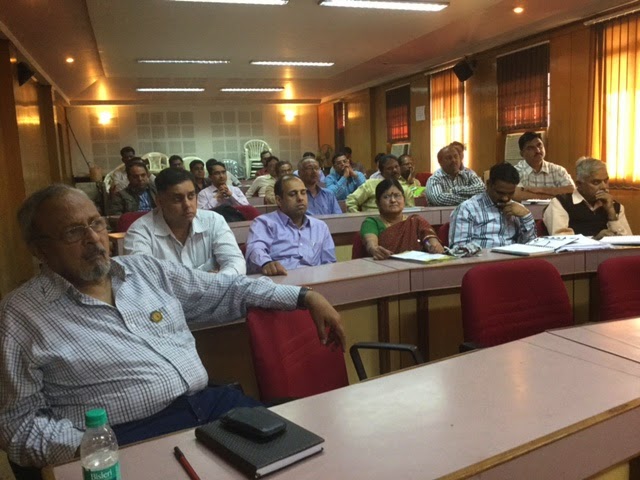The City Engineer, Pune through a notification in 2009, made Rain water harvesting mandatory for all new constructions in Pune. PMC also offered 5 % discount to those properties who implement RWH . The aim of this policy was to improve falling ground water levels in the city. However, a need was noticed to train PMC engineers on modern RWH systems & its benefits to enable them to carry out better inspections of the RWH systems implemented on different properties.
Keeping this in mind, Col S G Dalvi, Directory of Parjanya and NSCC, Pune approached the Commissioner of Pune, to organise a workshop. The Commissioner (PMC) and the City Engineer agreed to the proposal. On Friday 16 Jan 2015, the workshop was conducted from 3.30 pm to 6.00 pm at the Capt Wadke auditorium in Corporation Building. Col S G Dalvi conducted the workshop.

About 40 PMC engineers, members of the NSCC Pune and some activists like Mr Niranjan Upasani attended the workshop. The president of NSCC Pune Mr Satish Khot inaugurated the workshop. He welcomed the audience. He appreciated the introduction of RWH notification by PMC City Engineer. He emphasised the need for proper implementation of the RWH policy. He said, that during the discussion, with Col Dalvi, it was noticed that due to lack of awareness about RWH Systems & Benefits among PMC Engineers , proper audit / test of RWH systems could not be carried out.

Col S G Dalvi thanked the Commissioner, the City Engineer & NSCC Pune and Mr Satish Khot for organising the workshop. He explained importance & potential of rain water. Rain water is a primary source of water on our planet. Despite being aqueous planet, only 1 % of total water is fit for consumption on the planet. Of this 1 % India’s share is only 4 % where as our population share is 17 % of world’s population. Pune receives about 770 mm of annual average rain fall. It means 1000 sq ft of catchment area receives about 65,000 liters of rain water or 1 acre of land in Pune receives about 25 lakh liters of rain water. Pune city is located along three rivers Mula, Mutha & Pawana , also it has four man made dams Khadakwasla, Panshet, Varasgaon & Temghar to cater for city water needs. He explained reasons for present water crisis in Pune city. The present water crisis in Pune is mainly due to :
- Poor water management – Housing societies in fringe areas as well as newly constructed colonies get less than adequate water from the PMC, thereby increasing their dependency on water tankers.
- Water loss of 40% from source to our home - This is mainly due to leaking old pipes, which, in some cases, are up to 50 years old.
- Un-equal water distribution – Per capita water supply ranging from 300 liters per to about 50 liters as against the legislated 135 liters.
- Poor implementation of Rain Water Harvesting policy – The RWH policy came in to force in 2009 for all the new constructions as a mandatory arrangement. For old constructions, a 5 % property tax rebate was offered for those who implemented RWH systems. However there is no proper implementation of the policy.
- no water conservation policy - people wash their cars every day without realising that their ability to pay for water also means there is someone who is being deprived of their drinking water.
He explained the present status of the surface water , which is highly polluted due to entry of untreated domestic sewage as well as untreated industrial effluents. Due to concretisation of city & infrastructure developments the percolation rate of rain water is drastically reduced from 35 % to about 6 to 8 %. The rapid growth of city’s population has put strain on water management. Resulting in citizens depending more on ground water through bore wells as well as on Un hygienic Tanker water. In the absence of natural & artificial recharge of ground water , city water table is falling rapidly. Hence the urgent need for artificial recharge of ground water through bore wells by using RWH systems.
Col Dalvi then explained, with the help of pictures, the workings of the modern rain water harvesting system. The salient features of the RWH systems & its advantage over other RWH systems was explained to the audience. The types of storage of rain water as well as types of RWH Filters was explained to all present. Three case studies were discussed with the audience, explaining them the benefits of the RWH system . The major benefits are increased yield of the bore well, very reduced dependency on tanker water, reduction in electricity bills due to increased water table, in addition drastic reduction in carbon foot print of the society due to reduction in Tankers. On an average reduction of 1 tanker approximately reduces generation of 8 Kg of CO2 .
In the end stage was opened for questions by the audience, they asked many questions, ranging from working of filters, working of system, testing methods, costing of system etc. Mr. Kshirsagar, from PMC gave vote of thanks, he said this work shop was an eye opener for all the PMC staff present & thanked Col Dalvi for conducting the educative & informative workshop.

No comments:
Post a Comment